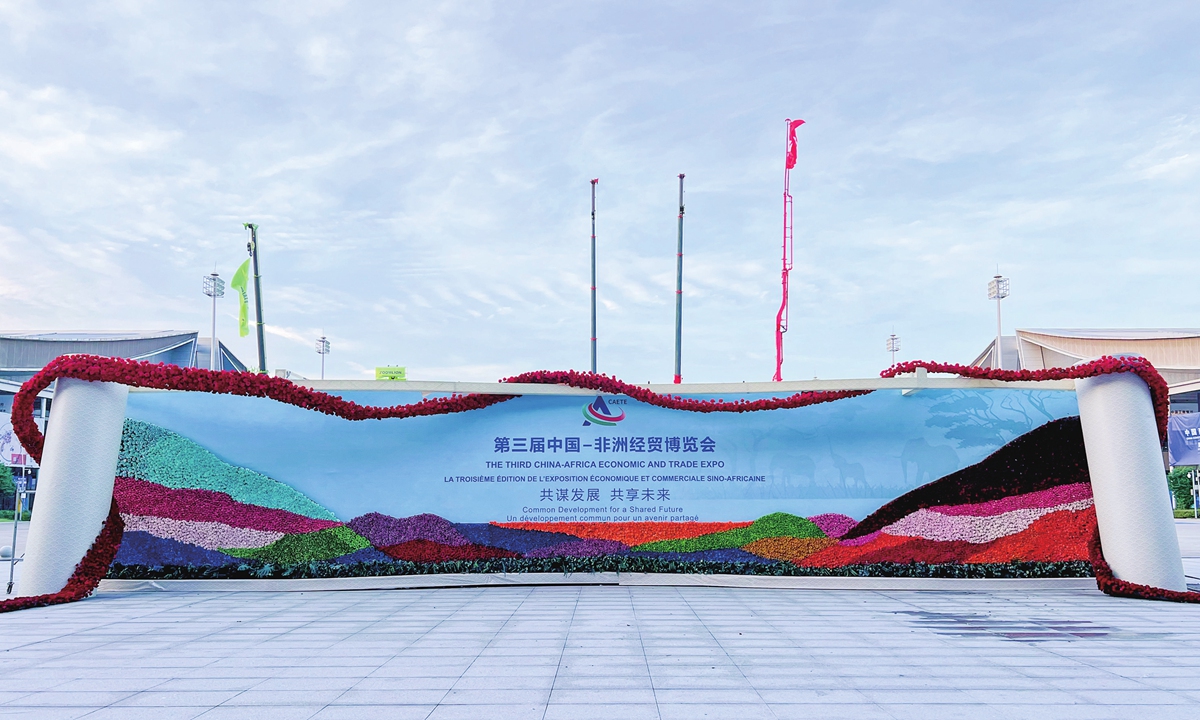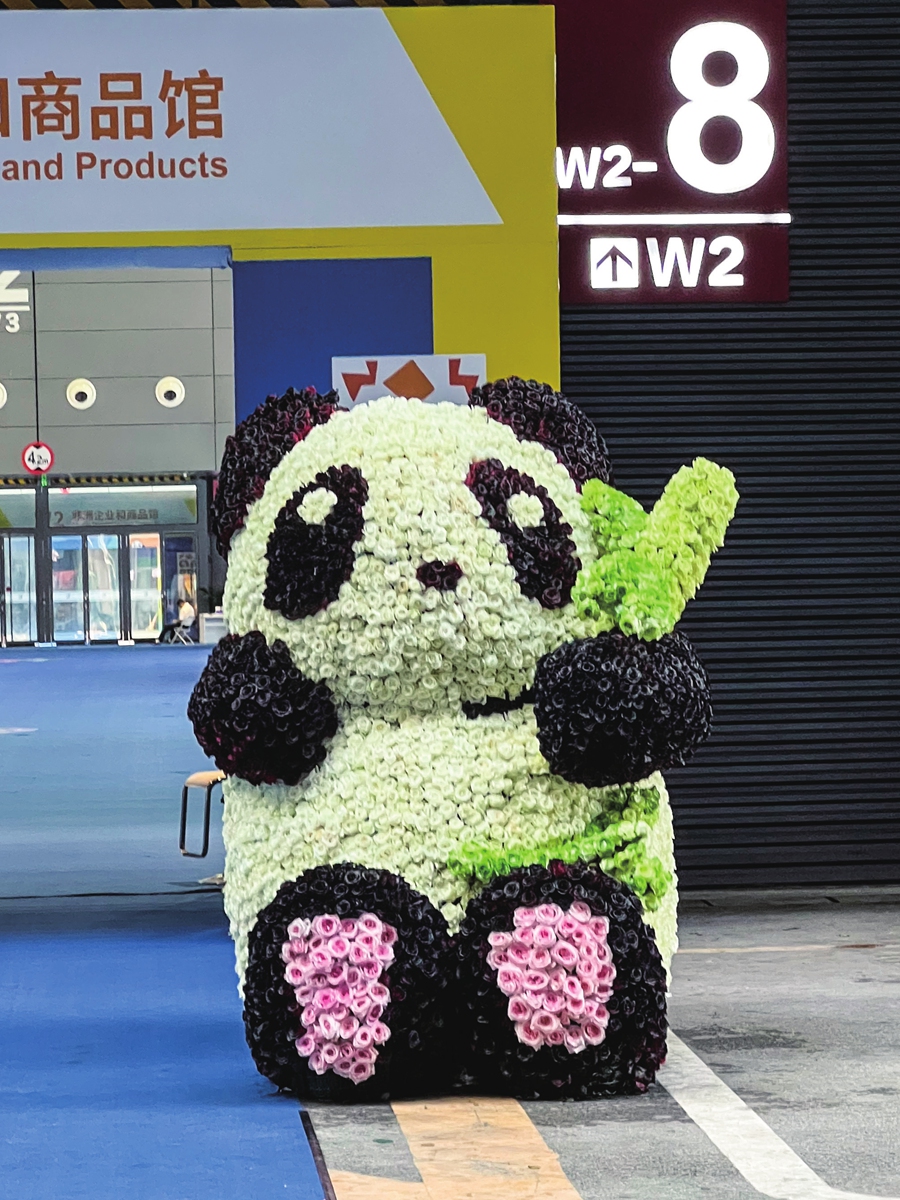
Flowers imported from Kenya are used for decorating a board of the Third China-Africa Economic and Trade Expo held in Changsha, Central China's Hunan Province, on June 29, 2023. Photo: Courtesy of Hunan-based Xiyue Cultural Media Co
How long will a rose take from being picked up in a farm in Kenya to reach the customers in Changsha city, Central China's Hunan Province? The answer is 17 hours.
At the just concluded Third China-Africa Economic and Trade Expo held in Changsha, mascots such as giant pandas, lions and rabbits made by Kenyan roses attracted many audiences for photos opportunities. The flowers are still fresh even though they have been on display for days.
In the past, it took about three days for flowers from Kenya to reach Changsha after the flowers were freshly cut. As the flights between Changsha and Nairobi have become more frequent, more flowers can reach the city quickly, Tang Yixian, who is responsible for the sales at Hunan-based Xiyue Cultural Media Co, told the Global Times.
According to Tang, the flight from Nairobi, Kenya, operated by China Southern Airlines has been increased to twice per week since April this year, helpful for keeping the flowers fresh as they reach Chinese consumers. The flying time between the two cities is only 12 hours.
Including the time it takes to pick up the roses at the farm and transport to the Nairobi airport, the customs clearance in Changsha, and the transportation from the airport to the customer, it takes a total of 17 hours for the flowers to reach the customers in China from the farm in Kenya, Tang said.
The company has supplied 5,000 flowers for the exhibition, and also distributed 15,000 flowers for visitors for free.
Well-organized flights"We have cooperation with local farms, and import more than 100,000 roses from Kenya per month. Our business has expanded thanks to the smooth transport," said Tang.
Behind the smooth transport of the flowers is the bright prospects of the high-quality development of China-Africa trade, and it is also inseparable from a well-organized logistics supply chain.
China is Africa's largest trading partner and its fourth-biggest source of investment. Official data shows that bilateral trade between China and Africa totaled $282 billion in 2022. In the first four months of the year, China's direct investment in Africa totaled $1.38 billion, up 24 percent year-on-year.
Eyeing for more opportunities in cooperation with Africa, Chinese companies continue to play an active role in consistently improving supply chains.
The expo also serves as an important window to see consumers' enthusiasm, as the event was attended by all 53 African countries that have diplomatic ties with China, 12 international organizations, more than 1,700 enterprises, business associations, chambers of commerce and financial institutions.
Six subsidiaries of COSCO Shipping, one of the state-owned enterprises, were present at the expo, showcasing their enthusiastic engagement in China-Africa cooperation.

A mascot of giant panda is displayed at the Third China-Africa Economic and Trade Expo held in Central China's Changsha on June 29, 2023. Photo: Courtesy of Hunan-based Xiyue Cultural Media Co
Smooth transport Xie Yunbang, from COSCO Shipping Bulk Co under COSCO Shipping, said that the company is actively promoting bauxite transport business in West Africa.
In 2018, the company signed a bauxite transportation contract with Aluminum Corporation of China in Guinea, followed by a transport contract with State Power Investment Co in 2020. Till now, more than 30 million tons of freight has been transported, said Xie.
"We are trying every possible method to serve the transportation needs and ensure a stable supply chain even amid the pandemic," Xie said.
Every year, COSCO Shipping transports building materials, hardware equipment, construction machinery, and light industrial products from China to Africa, and timber, agricultural products and ores from Africa, with the business covering East African, South African and West African countries.
"The cargo business between China and Africa is stable," Cai Zhixing from Shanghai-based Pegasus Corporation, told the Global Times.
"There are many projects developed by Chinese companies in Africa which have provided us continuous supplies, and countries such as Nigeria, Kenya and Tanzania are our key destinations," Cai said.
The bilateral trade has achieved remarkable growth in the past years. China released the China-Africa Trade Index for the first time during expo, providing a barometer for China-Africa economic and trade cooperation in a digital and scientific way.
Compared with the base reading of 100 recorded in 2000, the index rose to 990.55 in 2022, reflecting that bilateral trade remains on a rapid upward growth trajectory and is likely to continue to scale new heights, according to the index released by China's General Administration of Customs.
During the period, the import and export value between China and Africa hit 1.88 trillion yuan ($264 billion) from less than 100 billion yuan, representing a cumulative 20-fold increase and an average annual growth rate of 17.7 percent.
China Southern Airlines started the first direct flight from Hunan to Kenya in June of 2019, and increased the flight to twice per week in April with wide-body Boeing 787.
With the increasing frequency of trade between China and Africa and the rapid growth of e-commerce, the demand for supply services is bringing opportunities for logistics companies to expand into the African market.
During the exhibition, Hunan-based Xiaochengzi Tech signed a strategic cooperation deal with an African partner, vowing to set up a logistics service center in Africa. The company said it aims to establish a network in China and various regions in Africa, tap port advantages, and improve its comprehensive logistics service capability, according to rednet.cn.
In the eyes of Tang, the Africa market has huge growth potential, and the company is actively promoting new markets and growing new points for the business.
There are hundreds of varieties of roses in Kenya, but more than 85 percent of the flowers from Kenya are transported to Europe, and China still account for a small part it. "Our next step is to buy a piece of land there and expand," Tang said.





